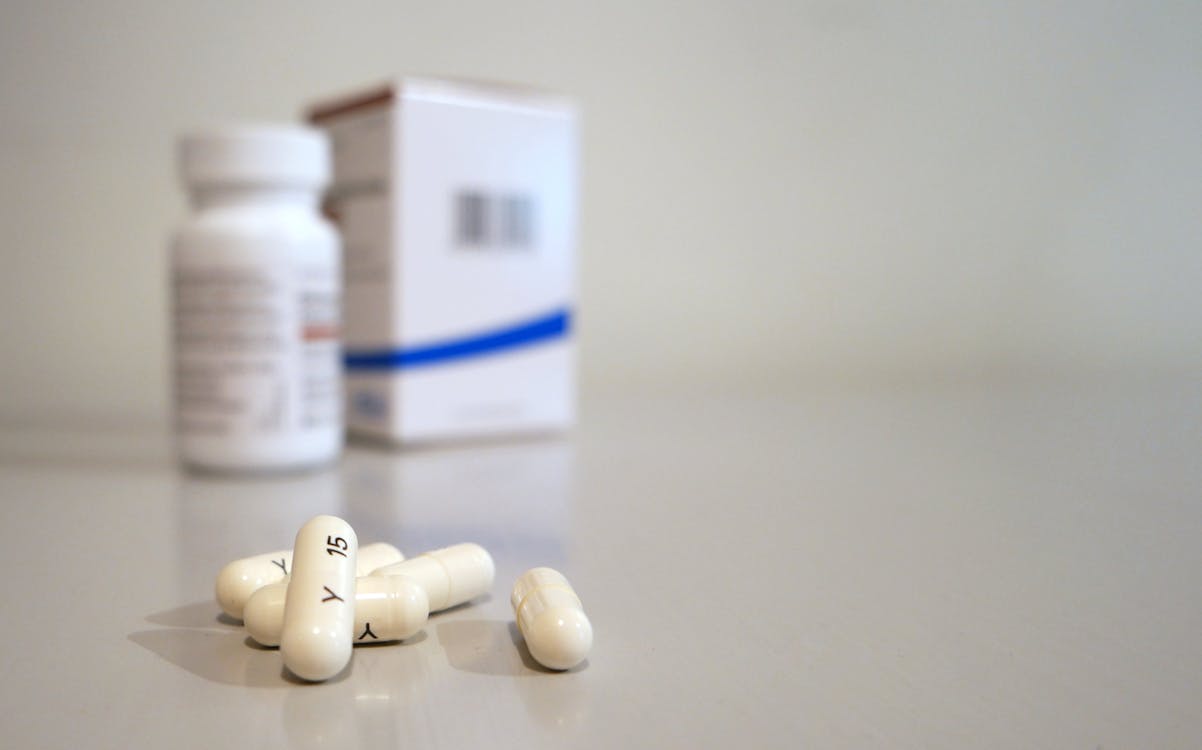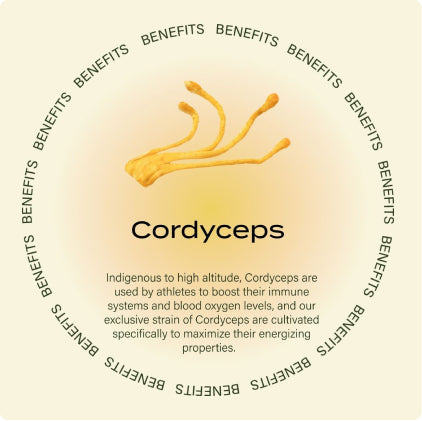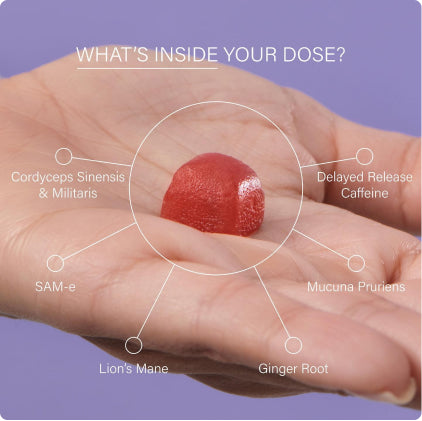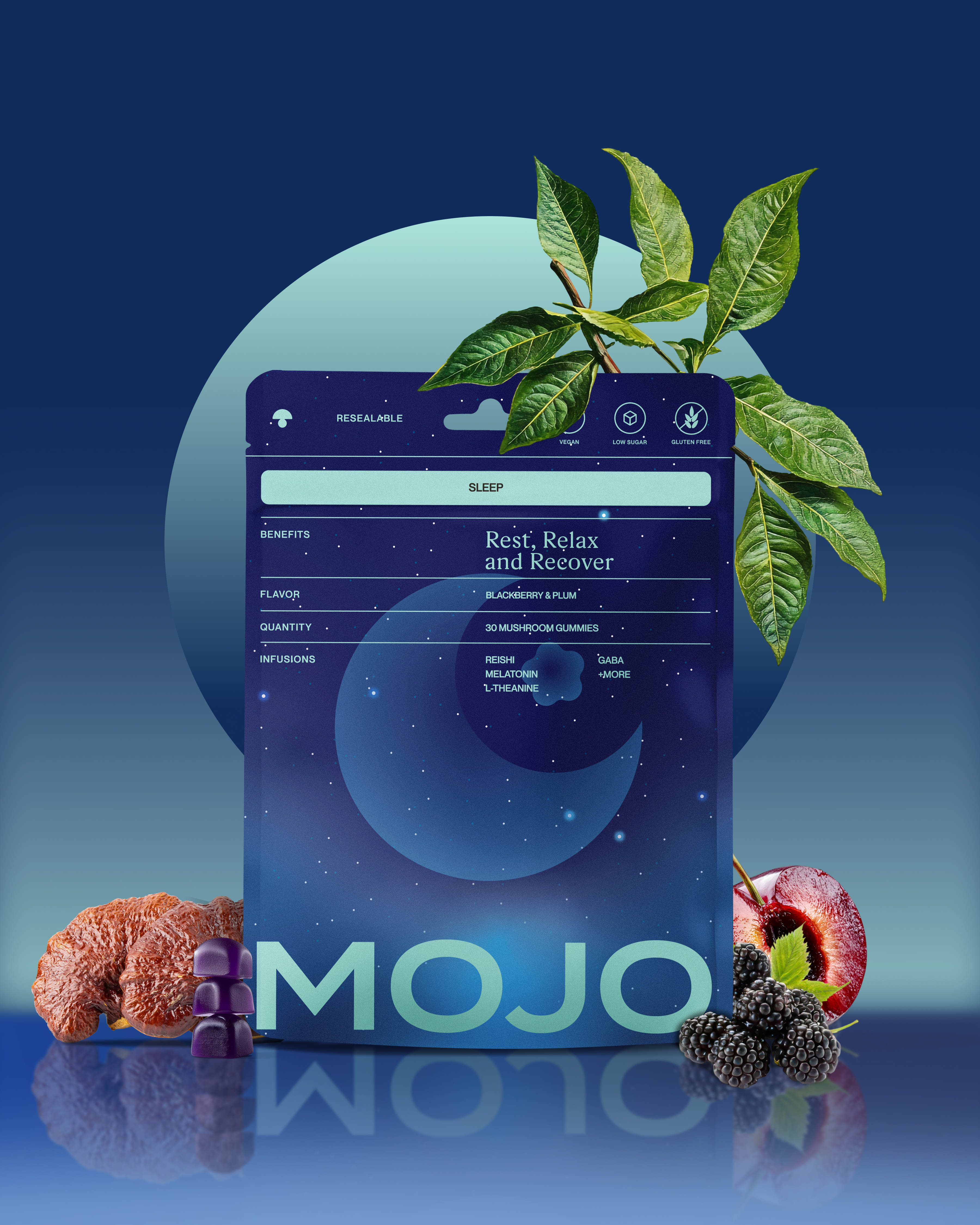Introduction
Attention Deficit Hyperactivity Disorder (ADHD) is a neurodevelopmental disorder that affects both children and adults, causing difficulties in attention, impulsivity, and hyperactivity. While medication and behavioral therapies are commonly prescribed to manage ADHD, many individuals seek natural alternatives due to concerns about potential side effects and a desire for holistic approaches.
In this comprehensive guide, we will explore various natural ADHD treatments for adults, including natural stimulants, lifestyle changes, dietary modifications nutritional supplements, and other therapeutic interventions.
Additionally, we will delve into clinical trials on the benefits of specific natural supplements like mucuna pruriens, Omega-3 fatty acids, GABA, and lion's mane mushroom in managing ADHD symptoms. Let's explore the world of natural solutions for managing ADHD and empowering adults to lead fulfilling lives.
History of ADHD
The history of Attention Deficit Hyperactivity Disorder (ADHD) is a complex journey that spans over centuries. The understanding and recognition of ADHD as a medical condition have evolved significantly over time. Let's explore the key milestones in the history of ADHD:
Early Observations (19th Century)
The first documented observations resembling ADHD date back to the early 19th century. Sir Alexander Crichton, a Scottish physician, published a book in 1798 titled "An Inquiry into the Nature and Origin of Mental Derangement." In this work, he described a group of symptoms that he referred to as "mental restlessness." He highlighted the characteristics of what we now recognize as ADHD, such as inattention, impulsivity, and hyperactivity.
Minimal Brain Dysfunction (Early 20th Century)
In the early 20th century, research on behavioral and cognitive disorders led to the concept of "minimal brain dysfunction" (MBD). This term was used to describe children with learning and behavioral challenges, including attention and impulse control difficulties. The idea of MBD laid the foundation for understanding ADHD as a neurodevelopmental disorder.
Hyperkinetic Reaction of Childhood (1960s)
In the 1960s, the term "hyperkinetic reaction of childhood" gained prominence to describe a group of children who exhibited hyperactivity and impulsivity. This term was included in the first edition of the Diagnostic and Statistical Manual of Mental Disorders (DSM) published by the American Psychiatric Association (APA) in 1952.
Attention Deficit Disorder (ADD) (1980)
In 1980, the third edition of the DSM introduced the term "Attention Deficit Disorder" (ADD) to encompass attention-related difficulties without hyperactivity. This classification recognized two subtypes: ADD with hyperactivity and ADD without hyperactivity. However, the DSM-III-R, published in 1987, combined these subtypes under a single category known as Attention Deficit Hyperactivity Disorder (ADHD).
DSM-IV and DSM-5
The DSM-IV, published in 1994, and its revised version, DSM-IV-TR (2000), further refined the diagnostic criteria for ADHD. The disorder was classified into three subtypes based on the predominant symptoms: predominantly inattentive, predominantly hyperactive-impulsive, and combined presentation.
In 2013, the DSM-5 was released, bringing further changes to the diagnostic criteria. The DSM-5 eliminated the subtypes and introduced the presentation of ADHD as predominantly inattentive presentation, predominantly hyperactive-impulsive presentation, or combined presentation.
Research and Neuroimaging
Over the years, research on ADHD has expanded, focusing on its neurobiological basis. Neuroimaging studies, such as functional magnetic resonance imaging (fMRI) and positron emission tomography (PET), have provided valuable insights into the brain regions and neurotransmitter systems associated with ADHD.
The involvement of dopamine and norepinephrine in ADHD has been a significant focus of research. These neurotransmitters play essential roles in attention, reward processing, and impulse control. Dysfunction in the prefrontal cortex, responsible for executive functions like planning and impulse control, has also been implicated in ADHD.
ADHD in Adults
The early understanding of ADHD primarily focused on children. However, as research progressed, it became evident that many individuals continue to experience ADHD symptoms into adulthood. The recognition of Adult ADHD led to better diagnostic criteria and treatments for adults with the condition.
Treatment Approaches
The treatment of ADHD has evolved significantly over the years. In the mid-20th century, stimulant medications, such as methylphenidate (Ritalin) and amphetamines, gained popularity to treat ADHD symptoms. While stimulants remain a cornerstone of ADHD treatment, behavioral therapies and psychosocial interventions have become increasingly integrated into comprehensive treatment strategies and plans.
Health impacts of leaving ADHD Untreated

Leaving ADHD untreated can have significant mental health impacts that affect various aspects of an individual's life. ADHD is a neurodevelopmental disorder that affects executive functions, which are essential for organizing, planning, and executing tasks. Without proper management and support, the following are some potential health impacts of untreated ADHD:
-
Academic and Occupational Challenges: Untreated ADHD can lead to difficulties in academic settings and work environments. Individuals may struggle to focus, complete assignments, meet deadlines, and retain information, affecting their academic performance and career advancement.
-
Impaired Social Skills: ADHD can interfere with social interactions and relationships. Untreated individuals may find it challenging to pay attention to conversations, take turns while speaking, and pick up on social cues, leading to social isolation and potential difficulties in forming and maintaining friendships.
-
Low Self-Esteem and Emotional Distress: Ongoing struggles with attention, impulsivity, and hyperactivity can erode self-esteem, leading to feelings of frustration, inadequacy, and depression. The emotional impact of untreated ADHD can be substantial and may contribute to anxiety and mood disorders.
-
Risk of Accidents and Injuries: Impulsivity and distractibility in individuals with untreated ADHD may increase the risk of accidents and injuries. These individuals may be more prone to tripping, falling, or engaging in risky behaviors without considering potential consequences.
-
Substance Abuse and Addiction: Some individuals with untreated ADHD may turn to substances like alcohol or drugs as a way to self-medicate, seeking relief from the challenges they face. This can lead to a higher risk of developing substance use disorders.
-
Poor Physical Health: Neglecting proper self-care and healthy habits can lead to adverse physical health outcomes. Untreated ADHD may result in difficulties adhering to medication schedules, neglecting nutritious diets, and lacking consistent exercise routines.
-
Impaired Driving Skills: For individuals with untreated ADHD, driving can be particularly challenging due to difficulties with attention and impulse control. This can increase the risk of traffic violations and accidents.
-
Financial and Legal Difficulties: Adults with untreated ADHD may struggle with managing finances, paying bills on time, and organizing important documents. Untreated symptoms can lead to financial problems and legal issues, such as unpaid bills and fines.
-
Relationship Strain: The challenges associated with untreated ADHD can put a strain on relationships with partners, family members, and friends. Communication difficulties and impulsive behavior may contribute to misunderstandings and conflicts.
-
Long-Term Impact on Education and Career: Over time, untreated ADHD can have cumulative effects on education and career opportunities. Consistent struggles in academics and job performance may limit potential achievements and advancement.
How is ADHD diagnosed today?

The diagnosis of Attention Deficit Hyperactivity Disorder (ADHD) involves a comprehensive evaluation process conducted by qualified healthcare professionals. Today, ADHD diagnosis typically a clinical practice guideline follows established criteria and guidelines outlined by professional organizations like the American Psychiatric Association (APA) and the World Health Organization (WHO).
The process involves a combination of clinical interviews, observation, medical history review, and symptom assessment. Here's an overview of the steps involved in diagnosing ADHD:
-
Initial Screening: The first step is often an initial screening, where a healthcare professional, such as a pediatrician, family doctor, psychiatrist, or psychologist, gathers information from the individual or their caregivers about the presenting symptoms and any concerns related to attention, impulsivity, and hyperactivity.
-
Detailed Clinical Interview: A thorough clinical interview is conducted to obtain a detailed history of the individual's symptoms, development, and behavior. The healthcare professional may ask about the duration and severity of symptoms, their impact on daily life, and the presence of any coexisting conditions or medical issues.
-
Behavioral Assessment: Behavioral assessments involve gathering information about the individual's behavior in different settings, such as at home, school, and social settings. Information from parents, teachers, or other caregivers is crucial in understanding how symptoms manifest across different environments.
-
DSM-5 Criteria: The diagnosis of ADHD is based on the criteria outlined in the fifth edition of the Diagnostic and Statistical Manual of Mental Disorders (DSM-5), published by the American Psychiatric Association. The DSM-5 categorizes ADHD into three presentations: predominantly inattentive, predominantly hyperactive-impulsive, and combined presentation.
To be diagnosed with ADHD, an individual must meet specific criteria, including:
-
Presenting with a certain number of symptoms (e.g., six or more) of inattention and/or hyperactivity-impulsivity for children up to age 16, or five or more symptoms for individuals aged 17 and older.
-
Symptoms must have persisted for at least six months.
-
The symptoms must be inconsistent with the individual's developmental level.
-
The symptoms must be present in at least two different settings (e.g., home and school).
-
Rule Out Other Conditions: It is essential for the healthcare professional to rule out other medical or psychiatric conditions that might mimic or coexist with ADHD. Conditions such as anxiety, depression, learning disabilities, and sleep disorders may share similar symptoms with ADHD.
-
Parent and Teacher Rating Scales: To supplement the assessment, standardized rating scales, such as the Vanderbilt ADHD Rating Scales or the Conners' Rating Scales, are often used. These scales involve questionnaires completed by parents, teachers, or caregivers to provide additional information about the individual's behavior and functioning.
-
Medical Evaluation: A medical evaluation may be conducted to rule out any underlying medical conditions that might contribute to ADHD-like symptoms.
-
Impairment Assessment: The healthcare professional assesses the level of impairment caused by the symptoms. ADHD is diagnosed when the symptoms significantly impact the individual's daily functioning, academic or occupational performance, or social relationships.
-
Differential Diagnosis: The healthcare professional will perform a differential diagnosis to distinguish ADHD from other conditions with similar symptoms. This process helps ensure an accurate diagnosis and appropriate treatment plan.
Understanding ADHD in Adults
ADHD is often considered a childhood disorder, but many individuals continue to experience its symptoms well into adulthood. In fact, it is estimated that about 4-5% of adults worldwide live with ADHD. However, adults with ADHD often face unique challenges, such as managing work responsibilities, maintaining relationships, and coping with daily stressors.
Symptoms of ADHD in adults may include difficulty concentrating, impulsivity, forgetfulness, disorganization, and difficulty managing time. These symptoms can significantly impact various aspects of life, leading to frustration, reduced productivity, off sleep habits and lowered self-esteem.
Common Pharmaceutical treatments and ADHD medications

Pharmacological treatments for Attention Deficit Hyperactivity Disorder (ADHD) are commonly a prescribed medication to help manage the core symptoms of the condition, including inattention, hyperactivity, and impulsivity.
The medications used for ADHD typically fall into two main categories: stimulants and non-stimulants. The choice of medication depends on various factors, such as the individual's age, symptoms, medical history, and response to treatment. It is essential to work closely with a healthcare professional to determine the most appropriate medication and dosage. Here are the common pharmaceutical treatments for ADHD:
-
Stimulant Medications:
a) Methylphenidate-Based Medications: Methylphenidate is one of the most widely prescribed stimulant medications for ADHD. It works by increasing the levels of dopamine and norepinephrine in the brain, which helps improve attention and focus. Some common methylphenidate-based medications include Ritalin, Concerta, Daytrana (patch), Metadate, and Quillivant XR (extended-release liquid).
b) Amphetamine-Based Medications: Amphetamine-based medications also increase dopamine and norepinephrine levels in the brain, providing similar benefits in managing ADHD symptoms. Adderall and Vyvanse are examples of amphetamine-based medications.
-
Non-Stimulant Medications:
a) Atomoxetine (Strattera): Atomoxetine is a non-stimulant medication that works by increasing norepinephrine levels in the brain. It is a selective norepinephrine reuptake inhibitor (NRI). Strattera may be prescribed when stimulant medications are ineffective or not suitable for a particular individual.
b) Guanfacine (Intuniv) and Clonidine (Kapvay): These medications are alpha-2 adrenergic agonists and are sometimes used as adjuncts to stimulant therapy or as standalone treatments. They can help reduce hyperactivity and impulsivity and improve attention.
It is crucial to note that medication is not the only approach to treating ADHD. In many cases, a combination therapy with a multimodal treatment plan that includes behavioral therapies, psychoeducation, and lifestyle modifications is recommended to achieve the best outcomes. Many forms of therapy can be effective intervention methods for relieving ADHD symptoms, and medications are typically prescribed as part of a comprehensive treatment strategy and should be combined with behavioral interventions whenever possible.
Risks with pharmaceuticals like Adderall

While medications like Adderall (containing amphetamine salts) and similar stimulant medications can be effective in managing ADHD symptoms, they also come with potential downsides and side effects. It is essential to carefully weigh the benefits and risks and work closely with a healthcare professional when considering these medications. Some of the downsides of using Adderall and similar meds include:
-
Side Effects: Common side effects of stimulant medications may include loss of appetite, difficulty sleeping (insomnia), irritability, stomach upset, headache, and increased heart rate. While many individuals tolerate these side effects well, they can be bothersome and affect daily functioning for some people.
-
Risk of Dependency and Abuse: Stimulant medications like Adderall have the potential for abuse and addiction, especially when used improperly or at higher doses than prescribed. Individuals with a history of substance abuse or addiction may be at a higher risk of misusing these medications.
-
Cardiovascular Effects: Stimulants can increase heart rate and blood pressure, which may be a concern for individuals with preexisting heart conditions or hypertension.
-
Emotional Effects: Some individuals may experience emotional changes while taking stimulant medications, such as irritability, anxiety, or mood swings. These effects can be particularly concerning for those with a history of mood disorders.
-
Sleep Disturbances: Stimulant medications can disrupt sleep patterns, leading to difficulty falling asleep or staying asleep.
-
Growth Suppression: In some cases, long-term use of stimulant medications in children may lead to a slight delay in growth. However, the growth rate typically catches up once medication use is discontinued.
-
Tolerance: Over time, some individuals may develop a tolerance to the medication, requiring higher doses to maintain the same effect. This can potentially lead to an increased risk of side effects.
-
Interaction with Other Medications: Stimulant medications may interact with other medications or substances, potentially leading to adverse effects or reduced efficacy.
-
Individual Variability: The response to stimulant medications varies among individuals. While some individuals experience significant symptom improvement, others may not find the same level of benefit or may experience intolerable side effects.
-
Withdrawal: Abruptly stopping stimulant medications can lead to withdrawal symptoms, such as fatigue, irritability, and increased appetite.
Natural ADHD Treatment for Adults

Because of the the downsides listed above, it's become more common for people to search for alternative treatments and Natural Remedies for ADHD.
1. Lifestyle Modifications
Lifestyle changes can play a crucial role in managing ADHD symptoms. Implementing the following practices can improve focus, reduce impulsivity, and attention disorders and enhance overall well-being:
a) Regular Exercise: Engaging in regular physical exercise and activities, such as walking, jogging, yoga, or swimming, can help regulate dopamine and norepinephrine levels, which are neurotransmitters involved in attention and mood regulation. Exercise also stimulates the release of endorphins, promoting a sense of well-being. Meta-analysis and systematic reviews have indicated that aerobic exercise and physical activity can have a positive effect on ADHD brains.
b) Mindfulness Meditation: Practicing mindfulness techniques can help to alleviate ADHD symptoms by better managing stress and increasing attention span. Mindfulness practices encourage individuals to focus on the present moment, reducing the distractions caused by racing thoughts.
c) Maintain healthy sleep patterns: Prioritize getting enough restorative sleep as inadequate sleep can worsen ADHD symptoms. A consistent sleep schedule and creating a calming bedtime routine can significantly improve sleep quality. Studies on lavender, vetiver, and rosemary have hinted that some essential oils may help improve sleep and focus -- two things that are crucial to people with ADHD.
d) Time Management: Developing effective time management strategies and using tools like planners or smartphone apps can help adults with ADHD stay organized and focused. Breaking tasks into smaller, manageable steps can prevent feeling overwhelmed.
2. Cognitive Behavioral Therapy (CBT)
CBT is a widely recognized therapeutic approach that can benefit adults with ADHD. CBT helps individuals identify negative thought patterns, develop coping strategies, and modify behaviors that contribute to ADHD-related challenges. The therapy equips adults with ADHD to manage impulsivity and improve time management skills.
3. Neurofeedback
Neurofeedback is a non-invasive technique that aims to regulate brainwave activity. By providing real-time feedback on brainwave patterns, individuals can learn to self-regulate their brain function, potentially reducing ADHD symptoms. Neurofeedback training can improve attention, focus, and self-control in adults with ADHD.
4. Herbal Supplements
Certain other herbal medicines and supplements have shown promise in managing and treating ADHD symptoms. However, it is essential to consult with a healthcare professional before incorporating them into a treatment plan. Some popular natural stimulants for ADHD include:
a) Mucuna Pruriens: Also known as the velvet bean, mucuna pruriens is a natural source of L-DOPA, a precursor to dopamine. Dopamine plays a critical role in attention and focus, and supplementing with mucuna pruriens may help improve ADHD symptoms.

b) Ginkgo Biloba: Known for its potential to make sleep medicine enhance cognitive function and improve attention. Ginkgo biloba's antioxidant properties may also protect brain cells from oxidative damage.
c) Bacopa Monnieri: An herb with potential memory-enhancing properties. Bacopa may support cognitive function, including attention, learning, and memory.
d) Ginseng: May improve focus and cognitive performance. Ginseng's adaptogenic properties may also help reduce stress, which can benefit individuals with ADHD.
e) Rhodiola Rosea: Known for its adaptogenic properties, which may help manage stress and improve concentration. Rhodiola may also boost mental stamina and reduce fatigue.
f) SAM-e (S-adenosylmethionine) is a naturally occurring compound found in the human body that plays a role in various biochemical processes. It is involved in the production of neurotransmitters, including serotonin, dopamine, and norepinephrine, which are essential for mood regulation and cognitive function. Some preliminary research indicates that SAM-e may have a positive impact on ADHD symptoms, particularly in improving attention and mood
G) Omega-3 Fatty Acids
Omega-3 fatty acids, commonly found in fatty fish (e.g., salmon, mackerel) and flaxseeds, are essential for brain health. Some studies suggest that omega-3 supplementation could improve cognitive function and reduce ADHD symptoms in some individuals. The omega-3 fatty acid DHA (docosahexaenoic acid) is particularly important for brain development and function.
H) GABA (Gamma-Aminobutyric Acid)
GABA is a neurotransmitter that plays a crucial role in reducing excitability and promoting relaxation in the brain. Individuals with ADHD may have imbalances in GABA levels, which can contribute to symptoms of restlessness and impulsivity. Supplementing with GABA may help calm the mind and improve focus.
I) Vitamin B6
B6, Also known as pyridoxine, has been studied for its potential benefits in managing ADHD symptoms. While it is not a replacement for standard ADHD treatments, some evidence suggests that B6 may have positive effects on attention, mood regulation, and neurotransmitter function, making it a complementary addition to a comprehensive ADHD management plan.
-
Neurotransmitter Function: Vitamin B6 plays a crucial role in the synthesis of neurotransmitters, including dopamine and serotonin. Dopamine is involved in attention, focus, and motivation, while serotonin contributes to mood regulation and emotional well-being. Proper neurotransmitter balance is essential for individuals with ADHD, as imbalances can contribute to symptoms like inattention and impulsivity.
-
Potential Behavioral Improvement: A preliminary study found that B6 might be slightly more effective than Ritalin, a commonly prescribed ADHD medication, in improving behavior. However, it is important to note that more research is needed to establish the exact mechanism of action and the extent of B6's benefits for ADHD management.
-
Tryptophan and Serotonin: Some foods rich in vitamin B6, such as wild tuna, wild salmon, and grass-fed beef, also contain the essential amino acid tryptophan. Tryptophan is a precursor for serotonin synthesis. Consuming foods high in tryptophan can support the production of serotonin, which plays significant roles in sleep, emotional regulation, and overall well-being.
-
Mood Regulation: Vitamin B6 has been associated with mood regulation, and addressing mood disturbances can be particularly beneficial for individuals with ADHD who often experience emotional challenges.
-
Supporting Brain Health: Adequate intake of vitamin B6 is essential for maintaining overall brain health. By supporting brain function, B6 may indirectly contribute to improved cognitive abilities in individuals with ADHD.
J) Lion's Mane Mushroom

Lion's mane mushroom (Hericium erinaceus) is a medicinal mushroom known for its potential cognitive and health benefits. It contains bioactive compounds that may stimulate nerve growth factor (NGF) production in the brain. NGF is essential for the growth and maintenance of neurons, potentially supporting brain health and cognitive function. Lion's mane mushroom supplementation could enhance memory, concentration, and mental clarity in individuals with ADHD.
5. Elimination Diets
Certain dietary modifications may benefit adults with ADHD, particularly if they have sensitivities to specific foods. The elimination diet involves removing potential allergens or trigger foods from the diet for a period, then reintroducing them to identify any adverse reactions. Common culprits include artificial and food additives, preservatives, gluten, and dairy. Avoiding these allergens and eating less processed foods whenever possible can reduce brain inflammation - omega-3s may help with this as well. In some cases, food sensitivities may exacerbate ADHD symptoms, and avoiding these triggers can lead to noticeable improvements.
6. Acupuncture
Acupuncture, an ancient Chinese healing technique, has been studied for its potential benefits in managing ADHD symptoms. While research is still limited, some adults with ADHD report improvements in focus and emotional regulation after acupuncture sessions. Acupuncture may help balance the body's energy flow, reduce symptoms and improve overall well-being.
7. Martial Arts
Martial arts can be benefit children (and adults) with ADHD in various ways. Engaging in martial arts training can provide a structured and supportive environment that complements other ADHD management strategies. Here are some ways in which martial arts can help children with ADHD:
-
Improved Focus and Attention: Martial arts training requires concentration and focus on specific techniques and movements. Regular practice can help children with ADHD enhance their ability to concentrate and pay attention to instructions, which can be transferred to other areas of their lives.
-
Increased Self-Discipline: Martial arts emphasize discipline, respect, and self-control. Through consistent practice, children with ADHD can learn to follow routines, rules, and regulations, promoting self-discipline and improved behavior.
-
Enhanced Physical Fitness: Martial arts training involves physical activities that can help children with ADHD release excess energy and reduce hyperactivity. Regular exercise has been shown to have a positive impact on ADHD symptoms, improving mood and overall well-being.
-
Stress Reduction: The practice of martial arts often includes mindfulness and relaxation techniques, which can help children with ADHD manage stress and anxiety. These coping skills can be valuable in reducing the emotional impact of ADHD-related challenges.
-
Goal Setting and Achievement: Martial arts programs often set achievable goals and reward progress. Children with ADHD can benefit from the sense of accomplishment and motivation that comes with achieving milestones in their training.
-
Social Interaction: Martial arts classes provide an opportunity for children with ADHD to interact with peers and instructors in a structured setting. Improved social skills and teamwork can result from positive interactions during training.
-
Increased Confidence and Self-Esteem: As children progress in their martial arts journey, they gain confidence in their abilities, leading to improved self-esteem. Positive reinforcement and support from instructors and peers can further boost their self-confidence.
-
Mind-Body Connection: Martial arts emphasize the importance of the mind-body connection. This awareness can help children with ADHD develop a better understanding of their emotions and impulses, leading to improved emotional regulation.
It's essential to note that the benefits of martial arts for children with ADHD may vary from individual to individual. The effectiveness of martial arts as an ADHD management strategy can be further enhanced when combined with other evidence-based treatments, such as behavioral therapies and, if necessary, medication.
Video Games for ADHD

Video games designed specifically to help with ADHD management are known as "brain-training games" or "cognitive training games." These games aim to improve cognitive functions such as attention, memory, and executive functions through targeted exercises and challenges. While they should not replace evidence-based treatments for ADHD, they can serve as supplementary tools to support cognitive development. Here are some video games that have been suggested to potentially benefit individuals with ADHD:
-
CogniFit: CogniFit offers a range of brain-training games designed to improve attention, memory, and other cognitive skills. The games adapt to the individual's performance, making them progressively challenging.
-
Lumosity: Lumosity is a popular cognitive training platform that offers a variety of brain games to enhance memory, attention, and problem-solving abilities. It provides personalized training based on the individual's performance.
-
Brain Age: Brain Age is a series of brain-training games developed by Nintendo for its handheld gaming consoles. These games offer various puzzles and challenges to stimulate cognitive functions.
-
Toca Life World: Toca Life World is an open-ended, imaginative game that allows players to create and explore virtual worlds. While not specifically designed for ADHD, it can provide a non-linear and creative environment to engage attention and foster problem-solving skills.
-
Focus Pocus: Focus Pocus is a game designed specifically to improve attention and focus in individuals with ADHD. It incorporates techniques from cognitive-behavioral therapy and includes various exercises to enhance focus.
-
PlayAttention: PlayAttention is a neurofeedback-based video game designed to improve attention and impulse control. It uses EEG technology to provide real-time feedback on brainwave activity.
-
Jungle Memory: Jungle Memory is a game aimed at improving working memory through engaging challenges and exercises.
Final Thoughts
ADHD is a complex neurodevelopmental condition that requires a personalized approach. While medication and therapy remain important, many adults are finding success with natural alternatives that support focus, mood, and overall well-being.
Lifestyle changes, physical activity, cognitive behavioral therapy, neurofeedback, and nutritional support can all work together to create balance and clarity.
Natural ingredients like Mucuna Pruriens, Omega-3 fatty acids, GABA, and Lion’s Mane mushroom have been shown to enhance cognitive function, reduce stress, improve focus, and support better sleep. These tools offer a holistic path to managing ADHD symptoms and improving day-to-day performance.
Finding and dosing each ingredient correctly can be difficult. That’s why we created Mojo, a precisely formulated gummy made with functional mushrooms, herbs, adaptogens, and roots to help boost attention, mood, and mental clarity.

Backed by numerous studies, they taste great, are vegan, gluten-free, and contain no artificial flavors or colors.
Since launching in 2021, we’ve sold more than 4 million gummies across the U.S. Mojo was named Product of the Year at the Microdose Awards and has been featured in Vice, Cool Hunting, Business Insider, and Forbes.

By embracing a personalized, comprehensive approach to ADHD, adults can unlock their potential and thrive in every area of life. Living with ADHD does not have to be a limitation. It can be an opportunity to understand your mind, harness your focus, and turn your unique wiring into a superpower.
Table of contents









